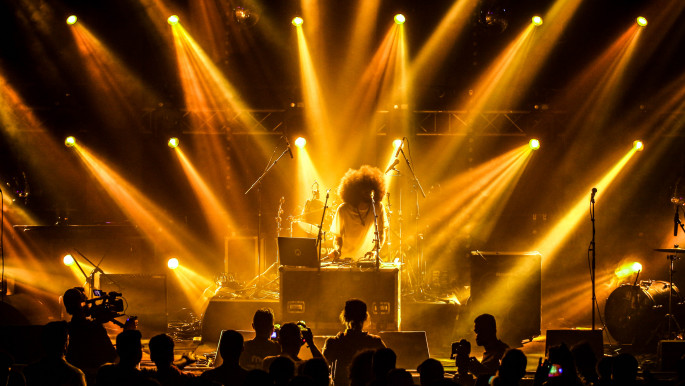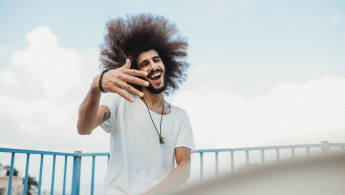Meeting Moody Kablawi: Palestine's trip hop artist who is ready to take on Europe
Showcased at the 2017 Palestine Music Expo in May 2019 he was in London performing at the Not the Eurovision Song Contest gig alongside other popular artists such as Wolf Alice and Lowkey, as well as recording a new disco EP.
The show's platform Globalvision, which streamed the music industry's protest response from around the world, was where he dropped his latest track and accompanying video, literally showing viewers and listeners the world through his own eyes: "Music, is the therapy of the nystagmus that I have. I was born with."
Nystagmus is a condition that involves involuntary movements in the eye, sometimes referred to as "dancing eyes."
Mali Mal (Got No Money) shows a pixelated Kablawi walking through pixelated streets, as he experiences a different vision of his surroundings due to the nystagmus.
Embracing one of the other major senses, of sound, Kablawi started his music career at 14-years-old when he started rapping in 2009, he released his first EP at 15. The first album ShaShi then came several years later in 2017.
Kablawi spent many of these formative years collaborating with other artists and playing in bands but says he was on a journey of finding himself as a musician.
Kablawi didn't just rap but learned to play instruments including the guitar, developing his craft. He now labels his music somewhere between trip hop, funk and punk, touching on disco and techno,"bringing the 80s sounds back in a way," he says, reaching to translate sound into words over a WhatsApp call from his base in Berlin.
Still at the tender age of 24, he's already toured around the world, "Ottawa, Canada, Maastricht, London, Switzerland, Berlin, [it's been] nice," he says with a giggle.
One of the big pushes in Kablawi's career arguably came from the Palestine Music Expo, not just as a platform but also to "get back in the game... and reach out to my own connections in Europe, it inspired me to do that."
Palestine Music Expo is now an annual three-day endeavour that runs in Ramallah, showcasing established and rising Palestinian artists to local and international music industry delegates.
While it may have given Kablawi a nudge in the right direction, it was his own life that launched him to the artist he is.
 |
Then I got into the system, and I started to understand what it is to be Palestinian inside Israel |  |
Kablawi explains his father's imprisonment, when he was a child, meant he had to go out to work from the age of 13, "To finish high school and get books and stuff like that. And then I got into the system, and I started to understand what it is to be Palestinian inside Israel."
Kablawi explains that Palestinians are of course aware about the physical occupation in the West Bank, but living in Israel, there is a mental occupation as well.
"Just going into jobs or other places and understanding that... You get more rights if you serve in the army [for instance]."
When Kablawi started rapping he was happy to perform on any stage but he got to a point where he understood that there were some stages he couldn't perform on, recounting when he was 15 the police stopped his show: "They told me we got our eyes on you, your first song is about Gaza."
 |
|
| Kablawi spent many of these formative years collaborating with other artists and playing in bands [Reem Jarrar] |
Fellow Palestinians also objected to the singer's choice of venues saying it amounted to "cultural washing." While that was not his intention, and Kablawi believed sharing his music with its message, whatever the platform, was valid, he learned the hard way how that was not the case, he says.
"Boycotting is important, first of all, to spread awareness," says Kablawi explaining his point of view. "There's lots of normalisation happening all over the world," he continues. "But no, there is hunger, there is occupation, there's people in Gaza dying daily, airstrike[s], there is a war happening constantly.
"Boycotts work, I think as an apartheid country, it is not only a main source of awareness [internationally], but it's a main source of awareness to our Jewish neighbours."
 |
Boycotts work, I think as an apartheid country, it is not only a main source of awareness [internationally], but it's a main source of awareness to our Jewish neighbours |  |
Getting searched at airports – "they even searched my afro," he says – confiscating his equipment, and even getting treated like "second-class citizens" is nothing compared to the physical occupation in the West Bank, which he says is home of the Arabic hip hop movement in the region.
"I'm proud of the underground Palestinian scenes that we have in Ramallah and Haifa, you know, that underground independent scene that is not touching any government money or support... we are building our own community."
The scene, says Kablawi, is growing organically, and now it is common for artists from Haifa and Ramallah to perform at each of the other's location. Now he says that even DJs from Europe are performing in Ramallah. And there's room for the international scene to play a bigger role in bringing the events happening in the occupied territories to the wider global community. Such as the difficulty in getting permits.
 |
I believe in music as a musical language between humans, you know, and, and if politics and the materialist system is not allowing people to communicate with each other, music is our only hope for that |  |
He nods towards a 2018 documentary on Boiler Room TV on the Palestinian underground music scene that followed a week in the life of artists and friends between Ramallah and Haifa.
"I believe in music as a musical language between humans, you know, and, and if politics and the materialist system is not allowing people to communicate with each other, music is our only hope for that."
One thing Kablawi laments is that when you are Palestinian, everything is political, an unescapable reality.
"As a friend of mine always says and I really agree with him," shares Kablawi, "I just want to be an artist coming from Palestine and not a Palestinian artist."
Look out for the new EP this summer at moodykablawi.com
Sophia Akram is a researcher and communications professional with a special interest in human rights particularly across the Middle East.
Follow her on Twitter: @mssophiaakram



